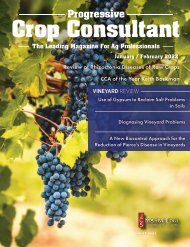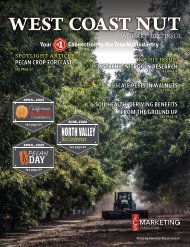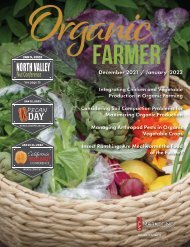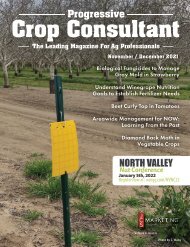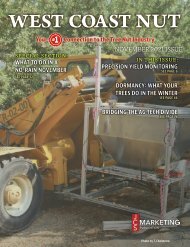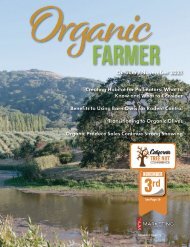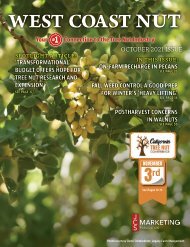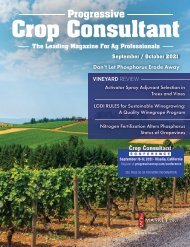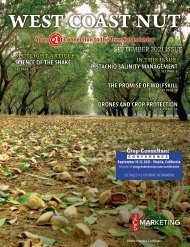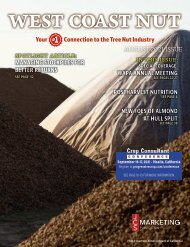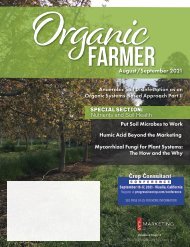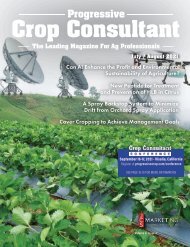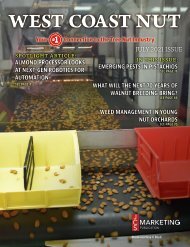WCN Dec e
Create successful ePaper yourself
Turn your PDF publications into a flip-book with our unique Google optimized e-Paper software.
Better<br />
coverage.<br />
Maximum<br />
performance.<br />
EMBRECE-EA ®<br />
enhances disease and<br />
insect protection with<br />
every application.<br />
Get even with pests<br />
and disease with<br />
more uniform<br />
distribution of your<br />
fungicides, insecticides and<br />
miticides. EMBRECE-EA ®<br />
is a safe yet powerful<br />
proprietary blend of<br />
nonionic surfactants that<br />
gives you superior coverage<br />
and penetration, leading<br />
to improved control over<br />
your targeted pest.<br />
So don’t spend time<br />
and money on another<br />
application until you’re<br />
ready to maximize<br />
every drop. Get more<br />
from each spray with<br />
EMBRECE-EA ® .<br />
WilburEllisAgribusiness.com<br />
THE POWER OF WE<br />
For information only. Not a label. Prior to<br />
use, always read and follow product label<br />
directions. WILBUR-ELLIS logo is a registered<br />
trademark of Wilbur-Ellis Company LLC.<br />
The Coalition plans to address habitat issues on an unprecedented scale for the benefit of the<br />
state’s beneficial insects, which include 1,600 species of native bees, managed honeybees,<br />
butterflies, beetles, wasps and more.<br />
Continued from Page 53<br />
and food production through on-farm<br />
and in-orchard projects, supported by<br />
technical guidance, research and documenting<br />
progress toward increasing<br />
healthier pollinator habitats.<br />
“What we are doing in California is<br />
acknowledging the urgency to address<br />
the critical issue of protecting all pollinators,<br />
including native and managed<br />
species,” said Adams. “Agriculture and<br />
conservation must work together to<br />
achieve this goal.<br />
“The outcome will not be a tidy<br />
report that sits on a shelf, but rather a<br />
metric of acres, projects and species<br />
added to the landscape while agriculture<br />
continues to profitably feed the<br />
nation,” she said.<br />
Extending the California almond<br />
industry’s commitment to protect honeybees<br />
during almond pollination, the<br />
Coalition plans to address habitat issues<br />
on an unprecedented scale for the<br />
benefit of the state’s beneficial insects,<br />
which include 1,600 species of native<br />
bees, managed honeybees, butterflies,<br />
beetles, wasps and more. Populations<br />
of many California pollinators are declining<br />
and often suffer from the same<br />
challenges as California’s agriculture.<br />
The Coalition will work together on a<br />
variety of fronts to support pollinators:<br />
Prepare grower-friendly guidance to<br />
build and maintain pollinator habitat<br />
on farms and ranches<br />
Conduct research and disseminating<br />
relevant science<br />
Monitor outcomes (adoption rates<br />
and effectiveness of practices)<br />
“Collaborative action can mitigate<br />
risks to California’s pollinators, and<br />
that’s exactly why this coalition has<br />
come together,” said Karen Ross, CDFA<br />
secretary of agriculture. “We need<br />
urgent action, yet the first step in the<br />
process is building trust that encourages,<br />
enables and enhances the result.<br />
The California Pollinator Coalition is a<br />
big step forward in a journey of grower<br />
and conservation groups voluntarily<br />
demonstrating leadership.”<br />
“This will not be an easy or quick fix,”<br />
Lewis said. “It will require a robust and<br />
sustained effort, but we are determined<br />
to be part of the solution. Almond<br />
growers and many other farmers<br />
depend on pollinators to produce a<br />
crop and pollinators depend on us to<br />
provide safe habitat. Working lands can<br />
and should be part of the solution.”<br />
“Farm Bureau supports voluntary,<br />
farmer-friendly efforts to improve habitat<br />
for native pollinators, and we have<br />
long advocated improved research on<br />
pollinator health,” said President of the<br />
California Farm Bureau Jamie Johansson.<br />
“We will work with the coalition<br />
for the benefit of native pollinators and<br />
managed bees, and to assure stability<br />
for the domestic bee business.”<br />
Comments about this article? We want<br />
to hear from you. Feel free to email us at<br />
article@jcsmarketinginc.com<br />
<strong>Dec</strong>ember 2021 www.wcngg.com 55




